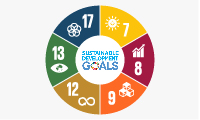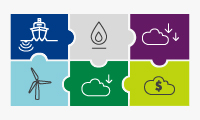Sustainable development goals
In 2015, the UN adopted 17 sustainable development goals (SDGs), which seek to address the world’s biggest challenges, including ending poverty, improving health and education, making cities sustainable and tackling climate change.
Governments are responsible for prioritising and implementing approaches that meet the SDGs. But achieving these tasks will require collaboration between civil society, governments, the private sector, non-governmental organisations and the public.
We welcome the SDGs and we continue to develop our approach to how we can help achieve them. All the SDGs are relevant to Shell’s operations to varying degrees and we are already contributing to many of these goals. In 2017, we prioritised six of the goals that have particular significance for Shell across our global business. Through IPIECA, the global oil and gas industry association for environmental and social issues, we have collaborated
with the UN Development Programme and the World Bank's International Finance Corporation to develop a shared understanding of how our industry can most effectively support the goals. Together, we launched the report Mapping the Oil and Gas Industry to the Sustainable Development Goals: An Atlas.
Read more about this on www.shell.com/sustainability – full list of links available on www.shell.com/sustainabilityreport
The priority SDGs for Shell are highlighted in the graphic below.
DECENT WORK AND ECONOMIC GROWTH
Employment is a critical route out of poverty and towards prosperity. We provide jobs and aim to follow labour, health and safety standards. We encourage local businesses to be part of our supply chain, and encourage our suppliers to meet Shell standards. We work with governments and others to offer training to build local skills and expertise. We support entrepreneurs through various programmes, including the Shell LiveWIRE programme, which helps young people start their own businesses. We also contribute to economic growth by paying taxes and royalties to local governments. (See Living by our principles, Local content and skills development, Contractors and suppliers and Tax and transparency.)
BUILD RESILIENT INFRASTRUCTURE, PROMOTE INCLUSIVE AND SUSTAINABLE INDUSTRIALISATION AND FOSTER INNOVATION
Shell often upgrades or builds infrastructure required for our projects, including roads and ports, and aims to minimise our impact on the local area. We support off-grid energy projects that can provide reliable, affordable energy in rural areas with little or no energy infrastructure.
Innovation is critical for sustainable growth. We spend around $1 billion each year on research and development to turn ideas into commercially viable technologies. Our innovations include fuels and lubricants that help customers use less energy, and technologies that improve the energy and water efficiency of our own operations.
RESPONSIBLE CONSUMPTION AND PRODUCTION
We aim to protect the environment and respect our neighbours. We work hard to avoid harm to people and set ourselves high environmental standards. This includes a focus on managing our greenhouse gas emissions, minimising our use of fresh water, conserving biodiversity and preventing spills and leaks. We meet and often exceed regulatory requirements.
We invest in a range of lower-carbon technologies and fuels and continue to work on improving the energy efficiency of our fuels and lubricants. Shell is taking part in several initiatives to encourage the adoption of hydrogen electric transport, and is developing a service that supports the charging of electric vehicles. We are one of the largest blenders and distributors of biofuels worldwide and are developing advanced biofuels that convert non-food plants into cellulosic ethanol.
CLIMATE ACTION
We are seeking cost-effective ways to manage greenhouse gas (GHG) emissions and see potential business opportunities in developing such solutions. We seek to contribute to reducing global GHG emissions in a number of ways: supplying more natural gas to replace coal for power generation; progressing CCS technologies; implementing energy-efficiency measures in our operations where reasonably practical; developing new fuels for transport such as advanced biofuels and hydrogen; and participating throughout the power value chain with a focus on natural gas and renewable electricity. To support this, we continue to advocate the introduction of effective government-led carbon pricing mechanisms.
We fully support the Paris Agreement, and its goal of keeping the rise in global temperatures to below two degrees Celsius. After having carefully listened to our critics, supporters and shareholders, we have set a long-term ambition to reduce the net carbon footprint of our energy products in step with society’s drive to reduce GHG emissions.
PARTNERSHIPS FOR THE GOALS
We work with governments, academics and industry specialists, and partner with companies and organisations to help meet the world’s growing energy needs. We share ideas and expertise to help encourage innovation.
We work with others to help reduce our impact on the environment and on people, to improve the quality of nature around our operations and to enhance benefits to local communities by implementing social investment programmes. Partnerships are also essential to help enhance safety and environmental standards and practices within our industry.
ENSURE ACCESS TO AFFORDABLE, RELIABLE, SUSTAINABLE AND MODERN ENERGY
Access to reliable and safe energy enables economic and social development and improves health, education and livelihoods. We aim to enable energy access by helping develop local energy markets and supporting entrepreneurs and partners in the development and distribution of energy solutions. (See Access to Energy and Local content and skills development.)
 Sustainability at Shell
Sustainability at Shell
 Sustainable development goals
Sustainable development goals
 About our data
About our data
 Energy transition and climate change
Energy transition and climate change
